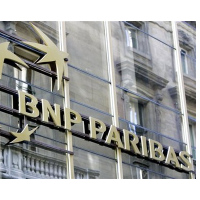French Bank Agrees to Pay $8.9 Billion Penalty for Helping Iran and other Governments Sanctioned by U.S.
 (photo: Rémy de la Mauvinère, AP)
(photo: Rémy de la Mauvinère, AP)
French bank BNP Paribas S.A. has agreed to pay nearly $9 billion in penalties for helping the governments of Iran and other nations avoid U.S. economic sanctions by processing billions of dollars through its accounts.
The deal, which includes admissions of guilt by one of the world’s largest banks for knowingly violating the International Emergency Economic Powers Act (pdf) and the Trading with the Enemy Act (pdf), will see it pay $8.9 billion.
The scheming by BNP Paribas—which occurred over an eight-year period—assisted interests in Iran, Sudan and Cuba in conducting business subject to sanctions imposed by Washington. The bank continued to violate the law even after being warned by its own lawyers that its conduct was illegal.
Legal experts hailed the agreement, noting its size for punishing such a large financial institution.
“This is the Gargantua of bank prosecutions,” Brandon Garrett, a professor of law at the University of Virginia, told the Corporate Crime Reporter. “The BNP plea will provide the largest forfeiture ever in a criminal case. It will amount to the largest total monetary payment in a corporate prosecution agreement. Those payments are far in excess of the criminal fine in the case. And the payments dwarf any in prior bank prosecutions.”
The payment is not tax deductible, and regulators will keep tabs on BNP Paribas’ financial records for five years under the deal.
“Requiring court-supervised probation for five years, together with a corporate monitor supervised by regulators, is a real improvement,” Garrett added.
In announcing the agreement, Attorney General Eric Holder described how BNPP “went to elaborate lengths to conceal prohibited transactions, cover its tracks, and deceive U.S. authorities.”
Holder said he hopes the punishment will cause other banks to take notice and avoid committing similar violations.
Against the backdrop of the Ukraine crisis and seeing an opportunity in the making, Russian President Vladimir Putin quickly used the banking scandal to try to drive a wedge between the U.S. and France by claiming that the hefty fine was a maneuver by the U.S. to blackmail France into cancelling plans to sell two warships to Russia. The Obama administration has denied any linkage between the financial penalty and other international matters.
The uncovering of the BNP Paribas scheme was inadvertently triggered by the actions of Stephen Flatow of New Jersey, who had filed a lawsuit over Iran’s alleged financing of a 1995 terrorist bus bombing in Gaza that killed his 20-year-old daughter, Alisa. Stumbling upon the lawsuit in 2006, the Manhattan district attorney’s office discovered, in the court filings, a claim that a Fifth Avenue office building was in fact a front for the Iranian government. When criminal charges were filed against two banks involved in Iranian transactions, a whistleblower came forward to implicate BNP Paribas, which led to further unraveling of its activities.
-Noel Brinkerhoff, Danny Biederman
To Learn More:
Tour de Fraud: BNP to Plead Guilty, Pay Nearly $9 Billion (Corporate Crime Reporter)
A Grieving Father Pulls a Thread That Unravels BNP’s Illegal Deals (by Jessica Silver-Greenberg and Ben Protess, New York Times)
BNP Paribas Assures It Has Ample Cash to Cover U.S. Penalties (by Noemie Bisserbe, Wall Street Journal)
Judge Rules Terrorism Victims can Seize $500 Million Midtown Manhattan Office Tower Owned by Iranians (by Noel Brinkerhoff, AllGov)
- Top Stories
- Unusual News
- Where is the Money Going?
- Controversies
- U.S. and the World
- Appointments and Resignations
- Latest News
- Musk and Trump Fire Members of Congress
- Trump Calls for Violent Street Demonstrations Against Himself
- Trump Changes Name of Republican Party
- The 2024 Election By the Numbers
- Bashar al-Assad—The Fall of a Rabid AntiSemite






Comments